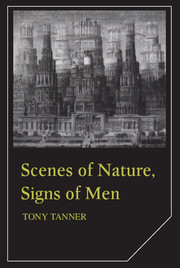Book contents
- Frontmatter
- Contents
- Preface
- 1 Scenes of nature, signs of men
- 2 Notes for a comparison between American and European Romanticism
- 3 Problems and roles of the American artist as portrayed by the American novelist
- 4 James on Hawthorne
- 5 The lost America – the despair of Henry Adams and Mark Twain
- 6 Henry James and Henry Adams
- 7 William Dean Howells and A Hazard of New Fortunes
- 8 Stephen Crane
- 9 The Bostonians and the human voice
- 10 Games American writers play: ceremony, complicity, contestation, and carnival
- 11 Toward an ultimate topography: the work of Joseph McElroy
- 12 Frames and sentences
- 13 William Gass's barns and bees
- Index
10 - Games American writers play: ceremony, complicity, contestation, and carnival
Published online by Cambridge University Press: 01 June 2011
- Frontmatter
- Contents
- Preface
- 1 Scenes of nature, signs of men
- 2 Notes for a comparison between American and European Romanticism
- 3 Problems and roles of the American artist as portrayed by the American novelist
- 4 James on Hawthorne
- 5 The lost America – the despair of Henry Adams and Mark Twain
- 6 Henry James and Henry Adams
- 7 William Dean Howells and A Hazard of New Fortunes
- 8 Stephen Crane
- 9 The Bostonians and the human voice
- 10 Games American writers play: ceremony, complicity, contestation, and carnival
- 11 Toward an ultimate topography: the work of Joseph McElroy
- 12 Frames and sentences
- 13 William Gass's barns and bees
- Index
Summary
But every now and then, players in a game will, lull or crisis, be reminded how it is, after all, really play – and be unable to continue in the same spirit … Nor need it be anything sudden, spectacular – it may come in gentle – and regardless of the score, the number of watchers, their collective wish, penalties they or the Leagues may impose, the play will, walking deliberately … say fuck it and quit the game, quit it cold.
(Gravity's Rainbow)How do we read books which emerge from our own environment, which are part of our ongoing contemporaneity? If we address ourselves to works of the past, products of a different society, a different economy, a different historical matrix, we are reading not only those works but by implication the silent language of anticipations and expectations, permissions and prohibitions, which surround them and make up their context. Whatever else a book may do it records a series of choices from the available discourses at a particular time. It is a commonplace to say that the condition of meaning is exclusion, but it is worth remembering when reading a book from the past that we are indirectly reading or being exposed to the tacit social rules and conditions which governed the exclusions and inclusions which are as much a part of the book as any more ostensible subject matter.
- Type
- Chapter
- Information
- Scenes of Nature, Signs of MenEssays on 19th and 20th Century American Literature, pp. 176 - 205Publisher: Cambridge University PressPrint publication year: 1987



